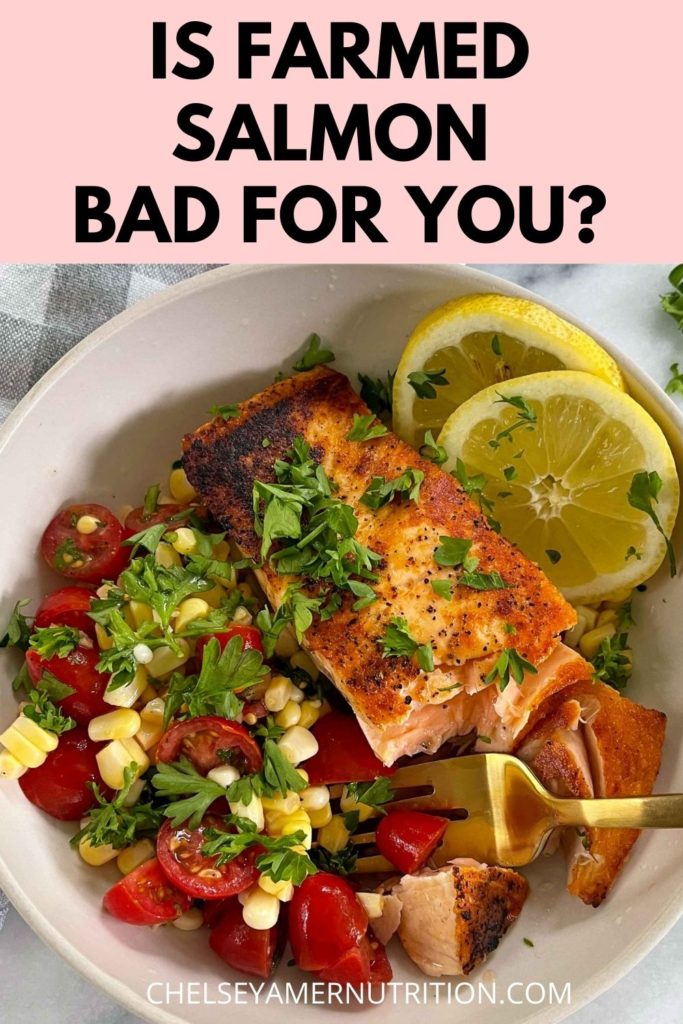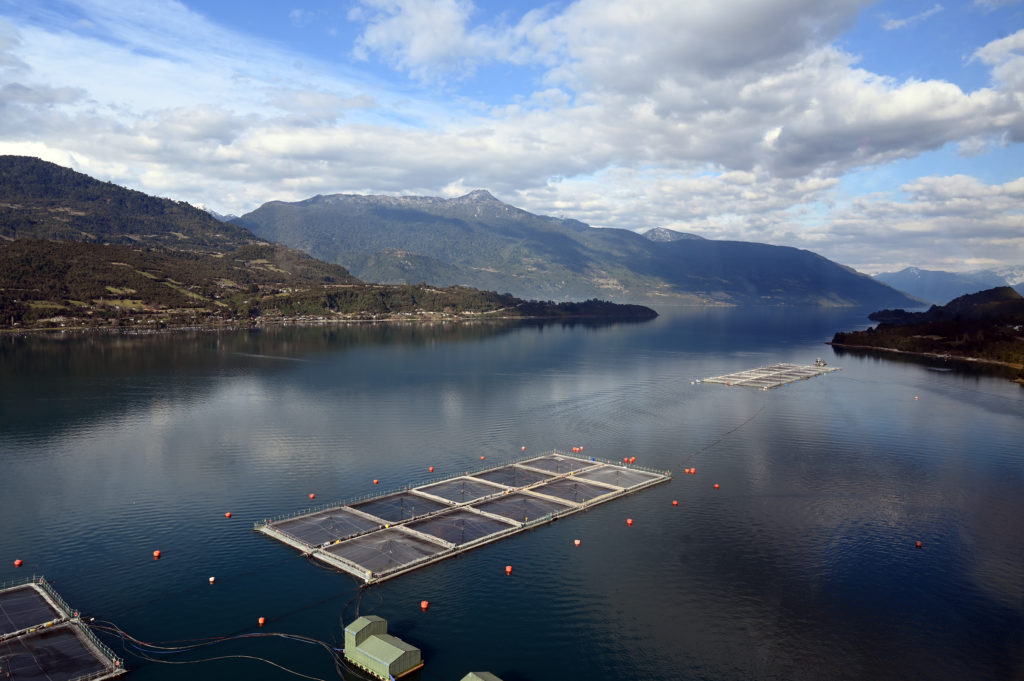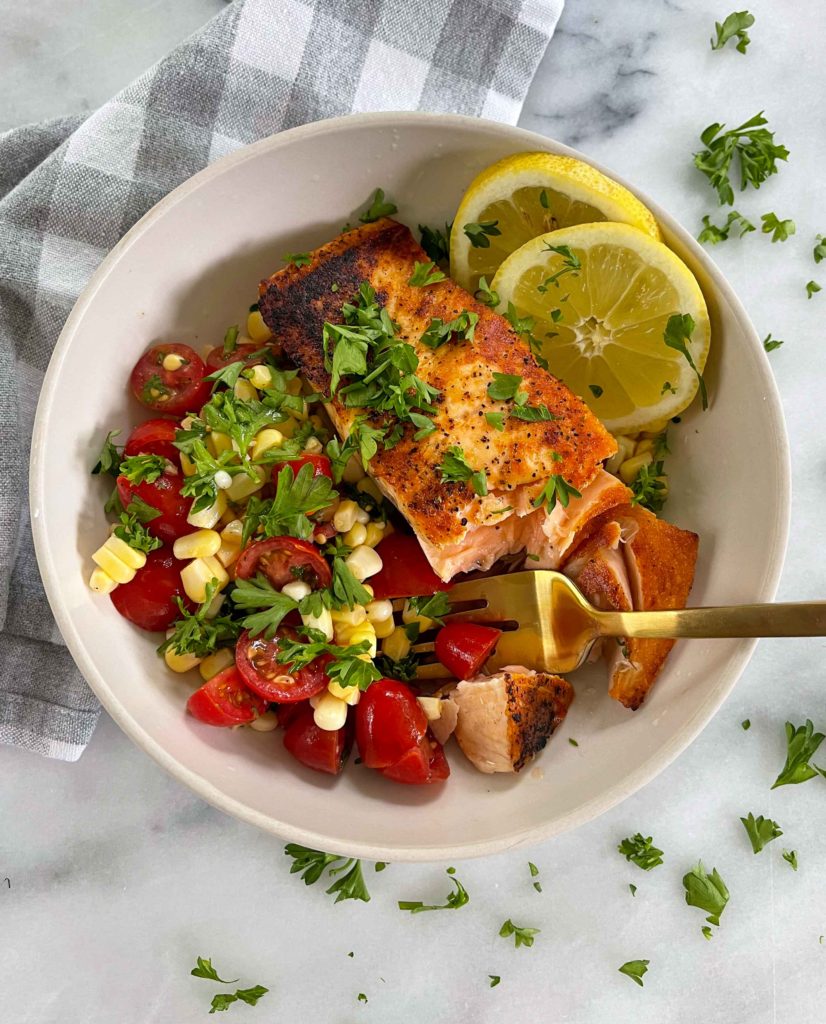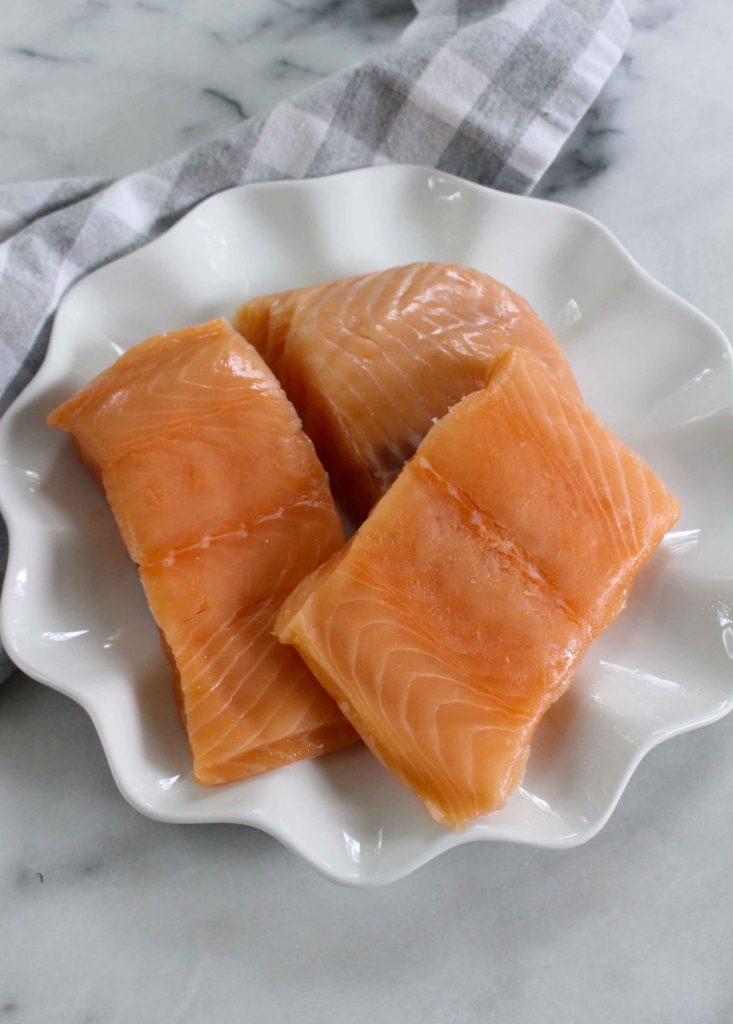Is Farmed Salmon Bad For You?
Is Farmed Salmon Bad For You? There’s so much confusion about salmon farming practices, so we’re breaking it down so you are an informed consumer and understand your options when it comes to purchasing salmon and the best choices for farm-raised salmon.

Disclaimer: This post is sponsored by the Chilean Salmon Marketing Council (CSMC), but all opinions are my own. Thank you for supporting the brands that make the Chelsey Amer Nutrition blog possible!
You probably know that salmon is an excellent choice to add to your plate. But if you’re like many consumers, you may be confused about what type of salmon to buy. There are so many options available at the supermarket! It’s important to consider your health, the environment, and responsible practices when purchasing fish.
There are several different species of salmon, but even more, there are different fishing practices. Salmon can be wild-caught or farm-raised. Although many people tout wild-caught salmon as superior, that’s not always true, for your health and the environment.
Today we’re going to break down the differences between wild-caught salmon and farm-raised salmon.
Is Farmed Salmon Bad For You?
NOPE. Farmed salmon is NOT bad for you. Farmed salmon IS good for you. Choosing responsibly farmed salmon, like Chilean salmon, is nutritious, delicious, and helps preserve our oceans.
What is Fish Farming?
The demand for fish continues to rise, but our oceans cannot keep up. Aquatic ecosystems produce less than 5% of the calories we consume. As such, farmed fishing practices were born to relieve the pressure of wild fisheries.
Fish farming is also known as “aquaculture.” Farmed seafood accounts for half of all fish eaten in the world.
Today there are many different fish farming practices and they are not all created equally. Responsible aquaculture practices, like those used to raise Chilean salmon, creates a nutritious, delicious, and environmentally-friendly result.
What is Chilean salmon?
Chilean salmon is Atlantic salmon raised in the Patagonian region of Chile. The consistently ice cold waters in Chile allow the fish to be available year-round. The region proudly follows strict aquaculture practices that protect the health of salmon and the environment and are committed to consistent improvements and innovations.

Why does farm-raised salmon get a bad reputation?
Farming practices are not what they used to be. Over the past decade farming practices have drastically improved. Currently, a lot of farmed fish are raised under excellent conditions and help make seafood consumption more sustainable for the environment.
Some past studies reported an increase in certain chemicals, such as PCBs (polychlorinated biphenyls), dioxins, and other trace chemicals in farmed fish, however, more updated studies prove that both farmed and wild salmon are low in mercury.
Even more, some studies show that the trace concentration of mercury is lower in farmed salmon compared to wild salmon.

How does the nutrition of farmed vs. wild salmon compare?
One of the main concerns I hear from people is that farm-raised salmon is not as nutritious as wild-caught salmon, and this is simply not true!
In most cases, farmed salmon contains the same amount and sometimes more anti-inflammatory omega-3 fatty acids, compared to wild salmon. Omega-3 fatty acids are important to protect your heart, brain, and eye health, plus lower inflammation in your body. Farmed salmon is also considered a “best choice” by the FDA because it’s low in mercury as previously mentioned.
Both farmed salmon and wild salmon are excellent sources of protein.
Most Americans do not eat enough fish. Relying on farmed Chilean salmon can be:
- More affordable
- Nutritious
- Delicious
- Reliable year-round
- Consistent

So is farmed salmon bad for you? NOPE! In fact, farmed salmon is good for you and a great choice. It’s just important to be aware of the source and make sure it’s reputable, like Chilean salmon!
What questions do you have about fishing practices?
Looking for ways to use Chilean salmon? Check out these delicious salmon recipes…
XO


 Hi there!
Thanks for stopping by! I'm Chelsey, an online Registered Dietitian, recipe developer, budding photographer, and coffee addict! My mission is to help you feel good through food by answering the question "What should I eat?" Let's make nutrition approachable!
I hope you enjoy my personal collection of simple, healthy, food allergy friendly and nutritiously delicious recipes, plus tips and tons of tricks that will help YOU live a nutritionally-balanced life! I look forward to getting to know you better...
Hi there!
Thanks for stopping by! I'm Chelsey, an online Registered Dietitian, recipe developer, budding photographer, and coffee addict! My mission is to help you feel good through food by answering the question "What should I eat?" Let's make nutrition approachable!
I hope you enjoy my personal collection of simple, healthy, food allergy friendly and nutritiously delicious recipes, plus tips and tons of tricks that will help YOU live a nutritionally-balanced life! I look forward to getting to know you better...







